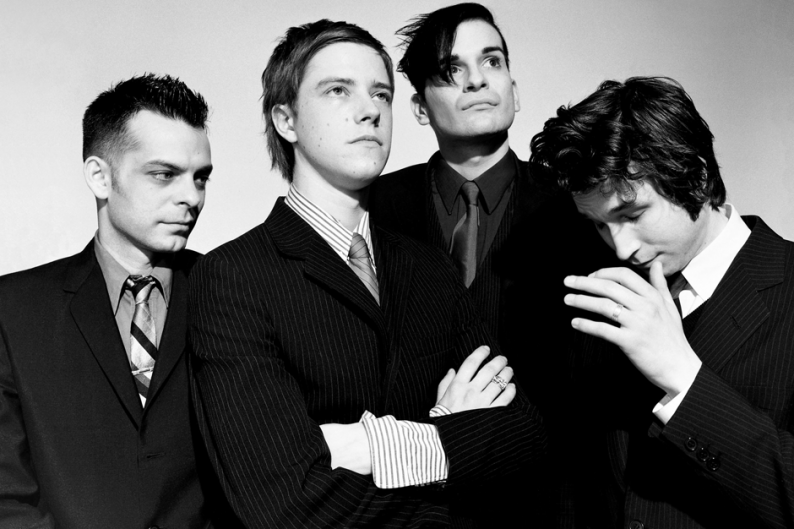“If you wear a suit and tie and play in a rock band,” says Interpol drummer Sam Fogarino, “people are gonna try and find you out.”
Fogarino is looking back, ten years ago, at the sometimes chilly critical reception given to his band. In 2002 Interpol released their debut, Turn On the Bright Lights, and not looking like Strokes or Stripes was enough to raise wary eyebrows. “People thought the way we dressed was a gimmick,” Fogarino says acidly. “Well, here we are still talking about an album that’s ten years old.”
On December 4, to commemorate Bright Lights‘ 10th anniversary, Matador will reissue a remastered version of the album along with a bonus disc of rarities from the band’s early days, the days when the members’ bespoke look still stretched the economic boundaries of their means. Back then, the New York City-based band’s glamorously dark stage presence seemed at odds with the then-prevailing garage-rock scruff. So did its sound. The rhythm section of Fogarino and vampiric bassist Carlos D. moved sleekly and sharply. Everything was nervy, taut. They didn’t swing, they throbbed. Compare Bright Lights’ “Say Hello to the Angels” with the Strokes’ “Last Nite.” Both songs are based on the Bo Diddley beat. The Strokes’ song sounds like a party. Interpol’s is a demand. They don’t just move you. They grab you by the shoulders and shake.
Elsewhere, particularly on the decadently melancholy “NYC” and “Untitled,” the album’s opener, guitarist and conceptual mastermind Daniel Kessler plays gorgeous, downcast lines, as if his notes were made of the light thrown from streetlights at three in the morning. On top of it all, Paul Banks sang melodies with a cold, deep croon. He sounded simultaneously disconnected and plugged in. And yes, at times he sounded an awful lot like Ian Curtis.
That fated quirk of vocal similarity certainly helped the band do as well as it did (Bright Lights went gold), but it also brought unwanted allegations. “It did bother me,” says Kessler about the Joy Division knock-off charges lobbed at the band in the early days. “But we learned not to take it personally. When I was a kid, I also used to say that a band is a cross between this and this and this. You can get mad about it, or you can realize that making comparisons is just something people do.”
There was a time, though, when any sort of attention — good or bad, clothes-centric or copycat-related — would’ve been welcome. “People don’t necessarily realize that the first album was the culmination of five years of work,” says Kessler. “We’d been playing around New York for a long time without getting anywhere. When we signed with Matador, we would’ve been thrilled with selling 10,000 copies. We just wanted someone to pay attention. We didn’t care why.”
That sort of pragmatism still defines the band’s attitude towards its breakthrough album. “I had a sense in terms of my evaluation of things that we were good,” says Banks, who’s almost perversely level-headed about the band’s ascent. “It’s not like [Bright Lights] was our golden record,” he argues. “We wrote songs after that album that were more fun to write.”
Fogarino is slightly more sentimental, at least when it comes to someone who is no longer around. “When we were putting this reissue together,” he says, “there were moments where I missed Carlos.” The bassist, who declined to be interviewed for this story, left the band in 2010. “There was a part of me that took it personally when he left,” Fogarino continues. “It was like, if you don’t have respect for this thing that I love, then fuck you. But I still love him. I miss the times when we were a unit together.”
He’s not the only one. Interpol have put out three albums since Bright Lights. They’ve all had their strengths, but the first flash of a band across the musical landscape is often the brightest. A career of dedicated, at times transcendent, craftsmanship is a worthy thing. It’s also nothing like the rise from obscurity — at least from afar. The bandmembers, of course, disagree. “I can’t say that first learning we could sell out shows in Los Angeles or hearing one of our songs on the radio is more magical to me than playing stuff from our last album [2010’s Interpol] to a crowd in Mexico and hearing them sing the all the words,” says Kessler.
Banks puts it more bluntly: “I don’t have any big romantic notions about the early days of Interpol.”
That’s where fans have an advantage over bands. Nostalgia isn’t as corrosive for us. But for the still-extant members of the early ’00s rock explosion cohort — those bands still young enough to look and feel vital, old enough to have experienced ebbs and flows in quality and popularity — their breakthrough albums can feel like a burden. The moment has passed. Interpol couldn’t repeat Turn On the Bright Lights if it wanted to.
But we can.





